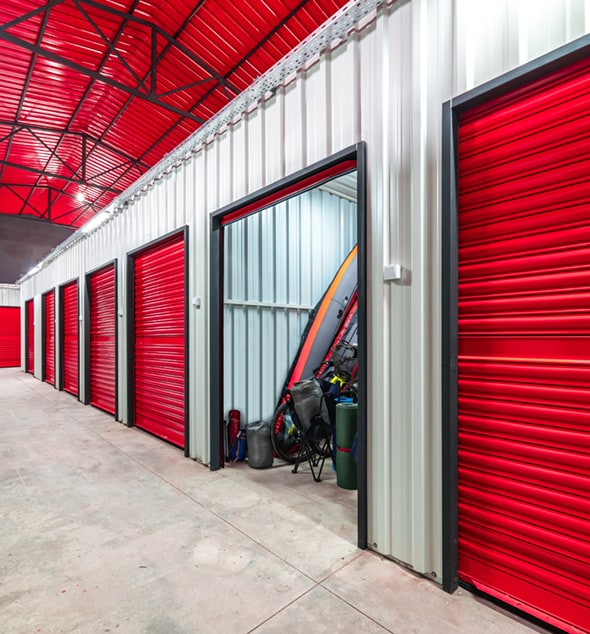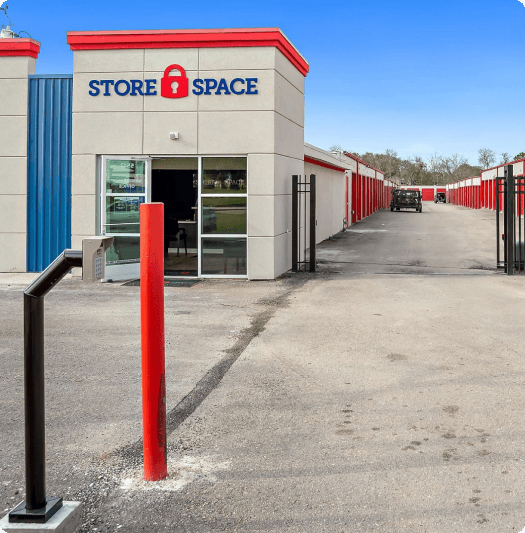College Packing List: 16 Things to Help You Have an Awesome Freshman Year
.jpg?sfvrsn=322f23e2_0)
Students tend to fall into one of two categories when packing for college. One is to start preparing 3 to 4 months in advance, have everything organized, color-coded, packed and ready to go weeks before the move-in date. The other is to show up to college with a toothbrush, one flip-flop and a couple of T-shirts.
There is no one right way to come up with your college packing list as you prepare for freshman year, but it’s a smart move to avoid the extremes and start somewhere in the middle. You should enjoy your last summer before college with family and friends, but still show up prepared and excited for your first semester.
We’ve put together a college packing list to help you get started. If you bring too much stuff, or your dorm room storage is not as good as you thought it would be, keep everything with Store Space! We’ve got plenty of room so you can focus on having a high-key, killer freshman year.
The Basics
Remember the basics. These are everyday things you should really have on your college packing list. Worst-case scenario, you can replace these at a nearby store, but let’s be honest, they might not have your super dope, favorite, distressed Rolling Stones shirt.
1. Clothes
Obviously, you need clothes for college. The dress code isn’t strict like it might have been in high school, but clothes are still required. Don’t forget your favorite band tee, ripped jeans or Chucks for the first day. Or PJ’s, shoes and any accessories you think you’ll need for the semester. You may also want to bring one professional outfit in case you attend a career fair, get offered an internship or want to pledge a fraternity.
Pro tip: Don’t overpack your clothes. Even if you’re not a big fan of doing laundry, you’ll figure out pretty quickly it’s a necessary evil. Also, only bring clothes for one or two seasons.
2. Toiletries/bath supplies
There are a lot of toiletries to remember, so it helps to go through your daily routine to figure out all the essentials. You’ll need bath supplies, including towels, robes, loofahs and cleaning supplies if you have a private bathroom. Guys, at least bring some soap and toothpaste.
Pro tip: Almost every college town (even those in the middle of Kansas) will have either a grocery store or drug store nearby, so don’t panic if you forget your toothbrush. Just make sure to go when Mom and Dad have their credit card ready. Also, many college campuses have a convenience store that stocks these items, too.
3. Bedding
You don’t want to sleep on a college mattress without your favorite pillow, comforter, or Superman sheets (just kidding, some people have Batman sheets). A lot of universities have detailed info online about bed sizes in their dorms, so be sure to check out what size bedding you need before you get there. (Many colleges have twin XL beds, FYI.)
Pro tip: Don’t go overboard with the pillows. Chances are, you’ll have a twin bed. You can’t fit 20 pillows on a twin bed—and they take up way too much room while moving. Plus, this article on pillows suggests about two for a twin bed.
4. Laundry supplies
As previously mentioned, you don’t have to love laundry to survive in college. But you do have to tough it out and do laundry at some point. If you’ve never done your own laundry before, you’ll learn fast. Make sure you bring detergent, fabric softener, bleach if you think you’ll need it, and two laundry hampers (one for clean clothes and one for dirty).
Pro tip: Some colleges offer free laundry, and others take coins or card payments. Don’t forget to check what your school offers so you can be ready for your first dorm laundry experience and read this article for some tips!
5. Some school supplies
Dreaded school supplies. You may have forgotten, but you’re going to college to learn! It’s a good idea to bring a few notebooks, paper and pens, a planner and a backpack. You may need more specific items when classes start but wait to get these until your professors tell you exactly what’s required.
Pro tip: Get a backpack with a laptop slot. Even if you take handwritten notes (go you!) you’ll still need to carry your laptop or tablet with you to write papers or do online assignments. After spending some dough on a nice computer, you’ll be grateful for an extra layer of protection.
6. First-aid kit
You don’t think about Band-Aids until you need one. Whether you get a papercut, your roommate stubs his/her toe and needs an ice pack, or your back needs a heating pad from carrying that heavy backpack around campus (freshman move, BTW), you, and your friends will be grateful you’re prepared for it all. Make sure you have bandages, rubbing alcohol, scissors, hand sanitizer, a mask and a thermometer. It’s a good idea to have a heating pad and ice pack, too.
Pro tip: These don’t have to be medical-grade kits, but you’ll also want to include some common medicines. Don’t forget acetaminophen or ibuprofen, eye drops, hydrogen peroxide and cough/cold/allergy medicine in your first aid kit.
Things You May Not Think Of
Everybody knows you should bring the basics of your college packing list, but what about the random things that didn’t even cross your mind? Here are a few that will be helpful to remember for freshman year!
7. Mattress pad
You don’t want to forget a mattress pad. College beds aren’t the comfiest, and you need to get good sleep for those 8 a.m. classes (another freshman move). Check out Target, Walmart or even Costco to find this essential dorm accessory!
8. Shower shoes
Ah. Shower shoes. It’s a great idea to have a pair of these. You don’t want to get a nasty bacterial or fungal infection from the shower floor. Simply use a pair of flip-flops, or if you want to show off your style you can get trendy shower shoes.
Pro tip: We can't stress this enough. Do not forget shower shoes.
9. Lint roller
This may not be the first thing you think of when you’re packing for college, but a lint roller can really come in handy. If you’re on the way to the career fair and your roommate’s cat rolled all over your only blazer, you may just be out of luck. But if you had a lint roller, you’d be fine and dandy!
10. Stain stick
Just like the previous item, a stain stick may seem unnecessary. But imagine you’re on your way to a date and you spill coffee on your white shirt. A stain stick would come in clutch.
Pro tip: If you’re prone to spills, don’t wear white.
11. Electric kettle
These are so underrated. If you like tea, electric kettles are awesome. If you don’t like tea, you can still use them for coffee, ramen, soup and any food or drink you need boiling water for. Talk about an all-in-one appliance.
12. Food
It seems like 90% of colleges require freshmen who live on campus to have a meal plan. Now there are different options, some more limited than others, so you may want to bring a few snacks. Instant mac 'n' cheese is a great idea, as are ramen, popcorn, chips, Hot Pockets, or pizza rolls. Pretty much anything that’s cheap and can be made with a microwave is the move.
Pro tip: It’s a good idea to have a mini fridge in your dorm if one isn’t provided. Make sure you talk to your roommate before you move-in because you don’t need two fridges!
13. Tool kit
You don’t have to be a buff handyman to carry a tool kit, especially in college. You’d be surprised how many students don’t bring one, and how many will actually need one. Now you don’t need a mega-professional 450-piece mechanic's toolset. But, find a tool kit with things like a hammer, screwdriver and duct tape just in case.
Pro tip: Either find a basic tool kit with a flashlight or remember to buy one separately! You never know when you might need one.
Don’t Forget
Here are a few bonus things you should be sure to remember going into freshman year. They’re not exactly things you can check off your college packing list, but they’ll help you out for your first semester!
14. Bring a positive attitude
As silly as it seems to include this in your “must bring” list, going into college with a good attitude is key. Don’t carry around high school drama and get ready to embrace this time in your life. You’ll be experiencing lots of new things in the next few months, and a positive attitude will make all the difference.
15. Pre-check with your roommate
If you’ll have a roommate freshman year, it’s a great idea to get in touch with them before you move in. Not only to get to know the person you’ll be living with but also to make sure you don’t bring two of the same things. If they are bringing a rug, you don’t need to bring one. Or, if they are bringing a mini fridge, you could bring the TV.
Pro tip: Most of the time when you’re assigned a roommate, the school provides a way to contact them (social media or phone number), so you can get to know each other before school starts. Use this asset so you can have a rockin’ dorm room!
16. Be ready to learn
College is the time in your young life to be social and embrace your independence, but the main reason you’re going is to learn! While you’re trying to meet new people and do fun things, don’t forget you’re paying for a college education along with the college experience.
FAQs
Q: What am I forgetting to pack for college?
A: There are a lot of random things you could be forgetting to pack for college such as an umbrella, hangers, tool kit, stain stick, shower shoes, mattress pads and more. But, read this blog for some ideas to start your packing list, and remember don’t panic! A lot of the small things you could forget will be available at a store near campus.
Q: What should you not bring to college?
A: A few things you should leave at home are furniture, all your clothes (only bring the clothes you’ll wear), your whole library and any prohibited items. Check out our blog about what not to bring to college for more ideas!
Q: How do I pack for college minimally?
A: A good way to pack less for college is to really think about what you’ll need. You won’t need winter clothes if it’ll be warm all semester, so you can leave them at home. You also won’t need lots of school supplies, or 10 decorative pillows. Remember if you forget something, chances are you’ll be able to buy it at a store by your school.
Q: Do you have to stay in dorms your first year of college?
A: It depends on the school. You have to stay in the dorms your first year of college at many universities. This is because many schools feel living on campus is beneficial to freshmen trying to transition to college. It will be easier to join organizations, meet friends and roll out of bed to get to class while you’re on campus.
Q: How can I survive college without meal plan?
A: You can definitely survive college without a meal plan, but you have to make sure your school doesn’t require freshmen to purchase one. If you don’t have to purchase a plan, buy lots of instant or microwaveable meals, cereal, learn how to cook, and make sure you have a fridge/freezer where you can store groceries!
Wrapping Up Your College Packing List
We hope this list has helped you start your college packing list and reminded you of a few things you may have forgotten. If you overpack for college, don’t worry. Keep it all with us. We have the extra space at affordable rates, perfect for college students! Use our storage location finder to find a location near your campus!
Don’t forget to check out our blog on maximizing space in a small apartment for tips on how to organize and decorate your dorm or apartment!







